Williamson Helps Study Family Ties in Guppies’ Mating
Tuesday, June 23, 2020

Visiting professor and alumnus Robert Williamson co-authored a recently published study from Florida State University that examined the role of kin selection in the mating habits of Trinidadian guppies.
Visiting assistant computer science and software engineering professor Robert Williamson's research focuses on the intersection of computation and biology. A recent project that studied kin selection was published in the journal Nature Ecology & Evolution.
Williamson, who earned bachelor’s degrees in applied biology and software engineering from Rose-Hulman, co-authored a study with Mitchel Daniel, a researcher from Florida State University. The study examined the strategies by which males choose to compete with rivals over access to females. These findings are key to understanding behavioral and social evolution.
The study looked at how male Trinidadian guppies, a small tropical fish, fight over females. The researchers' study revealed that male guppies are willing to help their brother out when it comes to getting the female. In fact, during competition one male will dart in front of another to block the competitor’s access to the female. More precisely, their results show that males avoid blocking their brothers’ access to females, preferring to compete directly with non-relatives.
This discovery is significant because it shows that the male guppies’ ability to recognize family members contributes to their decisions when competing for mates, according to the research team. The study supports an evolutionary theory called kin selection, which argues that individuals should help their close relatives to reproduce because they share copies of the same genes.
Daniel and Williamson developed a mathematical model and computer simulation which combined "selfish" natural selection and kin selection. This model predicts how males should behave to maximize how many copies of their genes get passed on to the next generation, whether through their own offspring or their relatives' offspring. The researchers found that the behavior of the male guppies in an experiment closely matched the predictions of this model.
The researchers also explored the effects of other variables on male decision making. They found that the males take into account the quality of each female and how many competitors are courting her. Male guppies chose whether to compete over a female based on these factors and how related the male is to the competitors courting that female. A male might even compete with his brother if the female is particularly high quality, for example. This research shows that male guppies take into account multiple aspects of their social environment when making mating decisions.
Williamson's teaching interests include programming, algorithms, genetics, and evolution. His research interests include population genetics, genomics, and simulation. He earned his doctorate in evolutionary biology from the University of Toronto in 2017 and after earning his bachelor’s degrees from Rose-Hulman in 2010.
Williamson, who earned bachelor’s degrees in applied biology and software engineering from Rose-Hulman, co-authored a study with Mitchel Daniel, a researcher from Florida State University. The study examined the strategies by which males choose to compete with rivals over access to females. These findings are key to understanding behavioral and social evolution.
The study looked at how male Trinidadian guppies, a small tropical fish, fight over females. The researchers' study revealed that male guppies are willing to help their brother out when it comes to getting the female. In fact, during competition one male will dart in front of another to block the competitor’s access to the female. More precisely, their results show that males avoid blocking their brothers’ access to females, preferring to compete directly with non-relatives.
This discovery is significant because it shows that the male guppies’ ability to recognize family members contributes to their decisions when competing for mates, according to the research team. The study supports an evolutionary theory called kin selection, which argues that individuals should help their close relatives to reproduce because they share copies of the same genes.
Daniel and Williamson developed a mathematical model and computer simulation which combined "selfish" natural selection and kin selection. This model predicts how males should behave to maximize how many copies of their genes get passed on to the next generation, whether through their own offspring or their relatives' offspring. The researchers found that the behavior of the male guppies in an experiment closely matched the predictions of this model.
The researchers also explored the effects of other variables on male decision making. They found that the males take into account the quality of each female and how many competitors are courting her. Male guppies chose whether to compete over a female based on these factors and how related the male is to the competitors courting that female. A male might even compete with his brother if the female is particularly high quality, for example. This research shows that male guppies take into account multiple aspects of their social environment when making mating decisions.
Williamson's teaching interests include programming, algorithms, genetics, and evolution. His research interests include population genetics, genomics, and simulation. He earned his doctorate in evolutionary biology from the University of Toronto in 2017 and after earning his bachelor’s degrees from Rose-Hulman in 2010.